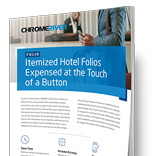Do you feel like pulling your hair out when you’re itemising line after line of hotel taxes, room rates, Wi-Fi charges and mini-bar fees on your expense claim?
One of the biggest frustrations that many travellers traditionally have with submitting expenses is the dreaded itemised breakdown, which many companies require. Plane ticket? How much was ticket versus checked baggage and other fees? Meal out with your team? Who were you with and how much was the tip?
For airline tickets and meals, what once involved breaking out the calculator and entering multiple expense entries can now easily be calculated with sophisticated expense management software, which makes it easy to split bills and air bookings with a single click.
However, one area that continues to cause major headaches is the hotel folio. Although some employers are happy to accept a single expense line item for the entire stay, it’s becoming increasingly more common for hotel stays to require being broken down by line item – room, tax, resort fee, parking, food and so on. Entering all these line items for one night may be an inconvenience, but for travellers who are on the road for a week or more at a time, it can become an administrative nightmare.
One of the solutions traditionally used to overcome this has been to use e-receipts, which hotels have sent directly to the traveller after their stay. These contain a full breakdown of fees, which can then be incorporated into an expense claim. However, over the past few years, several major global chains, including Hilton and Radisson, have upgraded their booking technology platforms and phased out these e-receipts.
Another solution is to use level 3 credit card data, which contains line-item breakdowns of spend, including hotel charges. However, this type of data may or may not be provided by the hotel and only available for some corporate cards – and not personal cards. All told, it can be a very hit-and-miss, and therefore unreliable process. For the weary business traveller, this has turned a once straightforward task into a cumbersome manual process.
This uncertainty drove us to adopt a new approach. Instead of relying on the hotels themselves to provide the folio data in a specific format that would work with our system, why not configure Chrome River so that it can easily read and extract data from any kind of hotel folio? This solution, Chrome River FOLIO, simply takes an emailed folio from a hotel, reads and automatically parses out the data and then creates individual line items for each element of the stay. Not only does it work with all the common chain hotels, from budget to five-star, but it can also read folios from boutique hotels just as easily and efficiently. Hotel guests simply forward the email from their hotel with the PDF, HTML or plain text folio data to Chrome River and it’s done – even from a mobile phone.
On top of this, the solution is also whip-smart. While the overwhelming majority of folio formats and layouts are already stored in its library, if it sees an unknown layout, it will read it and then create a new format, which will be stored next time you, one of your colleagues or anyone else visits that hotel.
Don’t find yourself stuck filling out line after line of Wi-Fi charges and mini-bar fees on your expense claim: Chrome River FOLIO can do it for you.
Search
Subscribe
Latest Posts
- UK Finance Leaders Reveal Biggest Concerns for the Post-COVID Recovery
- 9 Signs it’s Time to Switch Expense Management Systems
- Gartner and Ardent Partners Advise How to Build a Best-in-class Accounts Payable Operation
- When Cash (Control) is King: Is Your Accounts Payable Strategy Optimised for a COVID-19 World?
- Getting the Most Out of Your Spend Data with Emburse Insight Advisor
Posts by Category
Our choice of Chrome River EXPENSE was made in part due to the very user-friendly interface, easy configurability, and the clear commitment to impactful customer service – all aspects in which Chrome River was the clear winner. While Chrome River is not as large as some of the other vendors we considered, we found that to be a benefit and our due diligence showed that it could support us as well as any large players in the space, along with a personalized level of customer care.
We are excited to be able to enforce much more stringent compliance to our expense guidelines and significantly enhance our expense reporting and analytics. By automating these processes, we will be able to free up AP time formerly spent on manual administrative tasks, and enhance the role by being much more strategic.
